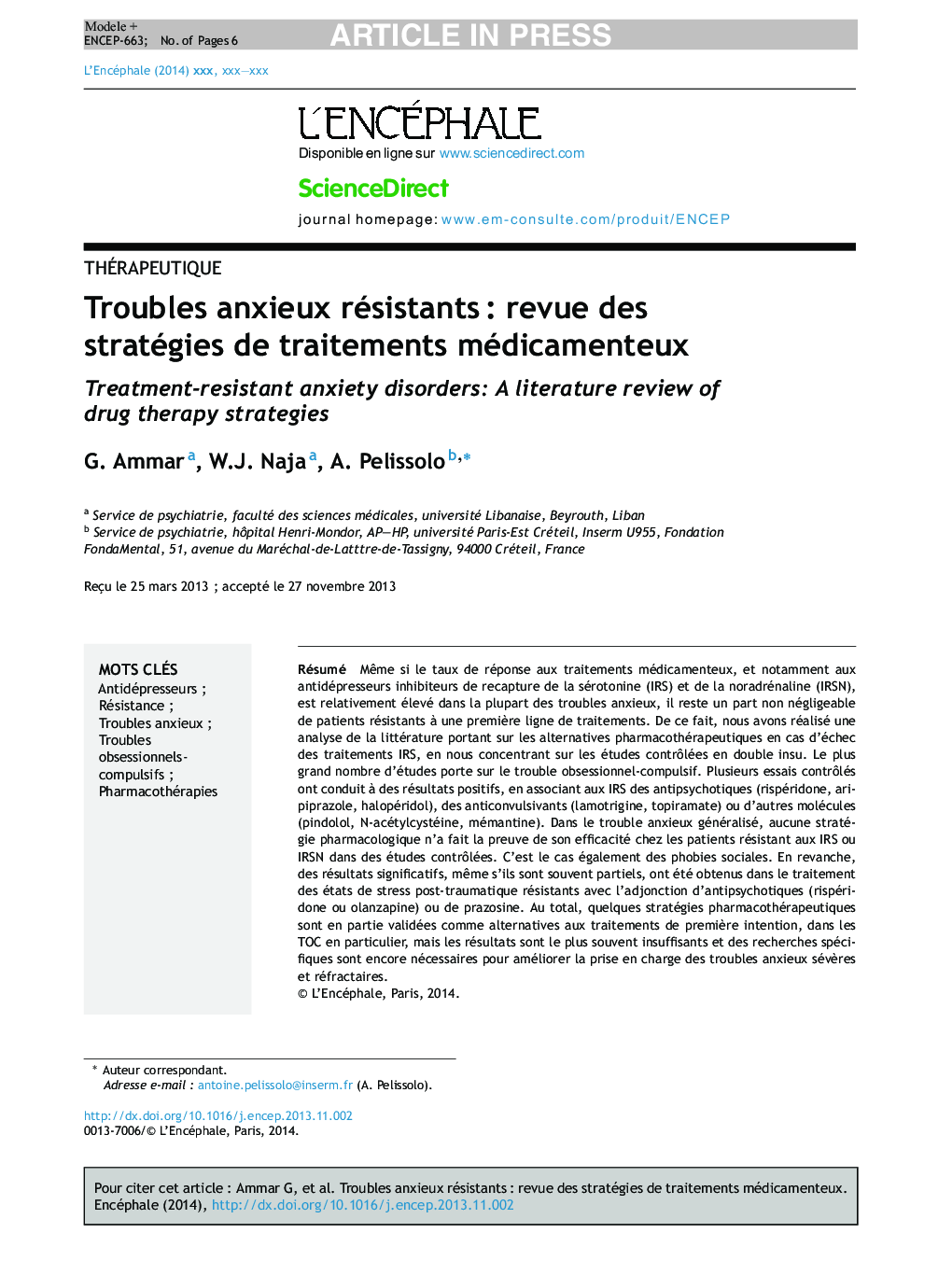| کد مقاله | کد نشریه | سال انتشار | مقاله انگلیسی | نسخه تمام متن |
|---|---|---|---|---|
| 4181668 | 1277135 | 2015 | 6 صفحه PDF | دانلود رایگان |
عنوان انگلیسی مقاله ISI
Troubles anxieux résistants : revue des stratégies de traitements médicamenteux
دانلود مقاله + سفارش ترجمه
دانلود مقاله ISI انگلیسی
رایگان برای ایرانیان
کلمات کلیدی
موضوعات مرتبط
علوم پزشکی و سلامت
پزشکی و دندانپزشکی
روانپزشکی و بهداشت روانی
پیش نمایش صفحه اول مقاله

چکیده انگلیسی
Anxiety disorders are widespread psychiatric conditions with significant social and professional disability, poor quality of life, an increased risk of suicide, and frequent attendance of medical services. Serotonin reuptake inhibitors (SRI) and serotonin and norepinephrine reuptake inhibitors (SNRI) have demonstrated a rather robust efficacy for the treatment of most of anxiety disorders. Nevertheless a substantial number of patients are resistant or still suffer from residual symptoms despite this first line treatment. The objective of our paper is to review relevant studies for the pharmacologic management of anxiety disorders resistant to the first line treatment. For this purpose, we conducted a pubmed/medline search for double-blind placebo-controlled trials of treatment-resistant anxiety disorders. An adequate trial for a SRI in the treatment of obsessive-compulsive disorder (OCD) should continue for at least 12 weeks. Special considerations of the comorbidities and symptom profile could help in the choice of an appropriate pharmacotherapy. Several trials have highlighted the efficacy of antipsychotics as an add-on to SRI in treatment-resistant OCD such as haloperidol more so when comorbid with a tic disorder, or risperidone that can reduce OCD as well as depressive symptoms. Aripiprazole has been shown efficacious in two placebo-controlled double-blind trials, while the efficacy of quetiapine and olanzapine remains controversial. Other trials showed some efficacy of anticonvulsants (lamotrigine, topiramate), pindolol, memantin and N-acetylcystein as an adjunctive treatment to SRI for resistant OCD. Few trials have investigated selective serotonin reuptake inhibitors (SSRI) or SNRI resistant generalized anxiety disorder showing a failure of adjunctive therapy with olanzapine, quetiapine, ziprasidone and risperidone. These studies were underpowered and very limited in number. Adjunctive risperidone for resistant post-traumatic stress disorder (PTSD) showed benefit in some but not all trials. Olanzapine was beneficial for the reduction of the CAPS score in addition to the improvement of sleep disturbances. Furthermore, prazosin was efficacious by reducing PTSD symptoms, sleep disturbances, nightmares, and psychological distress. One double-blind placebo-controlled study was conducted to investigate treatment-resistant social phobia showing no benefit of pindolol add-on paroxetine. Our results demonstrate that the pharmacological management of treatment-resistant anxiety disorders is not sufficiently investigated in double-blind placebo-controlled trials, despite a growing evidence in favor of antipsychotics and some other pharmacological agents in resistant OCD and, to a lesser extent, PTSD. Hence, there is a crucial need for larger double-blind placebo-controlled trials for resistant anxiety disorders. Finally, being out of the scope of our review, we omitted studies of non-pharmacologic therapies.
ناشر
Database: Elsevier - ScienceDirect (ساینس دایرکت)
Journal: L'Encéphale - Volume 41, Issue 3, June 2015, Pages 260-265
Journal: L'Encéphale - Volume 41, Issue 3, June 2015, Pages 260-265
نویسندگان
G. Ammar, W.J. Naja, A. Pelissolo,